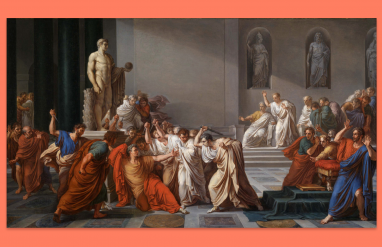While there are auto races held throughout the year, there are few better times to watch an event than summer. Case in point: races like the Indy 500, which is at the end of May.
Race fans are well familiar with the major events, of course, but even those who haven’t watched a full race in their life have almost certainly used some auto racing language. Because just as horse racing lingo zoomed into mainstream vocabulary, so did many auto racing terms (and there’s some overlap between the two, as you might imagine).
Bring your vocabulary up to speed with a review of the terms we’ve adopted from horse racing.
So readers, start your engines and get ready to race through these auto racing terms.
frontrunner
See definitionA frontrunner is someone in a race who performs well only when ahead of the field. The word can be taken quite literally as the racer in first place who establishes the pace for the rest of the field. (While it appears to have originated in horse racing, frontrunner was recorded as early as the 1910s in relation to auto racing.)
The definition has been stretched and widely applied since the days when frontrunner was used primarily for races. It’s now used to describe all manner of competitions—including political races. In the case of politics, the frontrunner can refer to the leader or favored contestant, not just a person who does best when ahead. The incumbent senator is the frontrunner in the race, though an upstart candidate is gaining steam and catching up, for example.
horsepower
See definitionThere are no horses in cars, but one common metric to measure what a vehicle is capable of is to measure it by what a standard horse would be capable of (and this goes for both racecars and the car in your driveway). That’s how we ended up with the term horsepower to measure the power of engines and motors, which is a unit of power equal to 550 foot-pounds per second, or 745.7 watts.
You might not be familiar with how much power a horse has, but it was an effective measurement in the early days of cars. James Watt, the 18th-century inventor of a new steam engine and the namesake for watt as a measurement of power, is responsible for the horse comparison. To sell his engines to people more familiar with horses, he calculated the standard amount of work that a horse can do in a second and told his potential customers that his engine could take the place of that many animals. You can imagine why that’d be an attractive proposition to have one six-horsepower engine instead of six horses.
The term has stuck throughout the centuries for vehicles. It’s also now commonly used in a metaphorical sense to describe what anyone, or anything, has the capacity to achieve or produce. The design team is renowned for its creative horsepower, for example.
pit stop
See definitionA pit stop is a common expression used to refer to any brief stop to get food, a drink, use the bathroom, stretch your legs, and do whatever else is needed during a long journey. A family could make a pit stop for lunch on their road trip across the country, for example, and a dog walker may have to make frequent pit stops at fire hydrants for the animals.
The phrase comes from auto racing, where a pit stop refers to when a car leaves the track to go to the pit to change the tires, get gassed up, and have other general services and repairs made. The stop part of the word is obvious. The pit refers to the section of the racetrack that’s set aside from the actual racing road where the driver can pull in and safely have the pit crew (the crew that services the car in, well, the pit) work on the vehicle. Just don’t be mistaken into thinking life in the pit slows down just because the car slows down—the standard professional pit stop in a race is less than 11 seconds.
checkered flag
See definitionThe checkered flag is a flag with a black-and-white square pattern that’s used to signal when the first car crosses the finish line. It’s something that every driver (or rider, since the checkered flag is used in horse racing as well) wants to see, since it’s an indication that a winner has been declared.
Checkered flags (or chequered if you follow British spelling) in racing date back to the 1906 American Automobile Association’s Glidden Tour, when the flag was used to signal to drivers to the checkpoints they needed to stop at. Today, the phrase is a stand-in for any finish line, as in, The students were almost finished with their project and could see the checkered flag.
Want to add some racing flair to your texts? Learn more about the Chequered Flag emoji 🏁.
raise a red flag
See definitionWhile this racing expression didn’t originate in the sport, it has a long and interesting history worth noting here.
To raise a red flag means to signal that there’s danger ahead. There are references of red flags being used in this way as far back as the early 1600s when a ship raised a red flag to show that it was going to engage in combat. When it comes to engine-powered vehicles, red flags were ordered to be used in England in the Locomotives Act of 1865. It stated that someone must carry a literal red flag ahead of any train to warn people on horses or in a horse and buggy that a train was coming through.
Of course, there’s no combat or horses in the way in an auto race (or there shouldn’t be at least). Race officials instead use the red flag to show that there’s been a crash or there are dangerous conditions ahead. Raising one stops the race until the danger has been cleared. It’s an expression still used outside of racing as well. A red flag is anything that’s a warning sign for trouble, as in, The employee’s aversion to work raised a red flag for all who depend on them.
grand prix
See definitionA grand prix is a major auto race that covers a tough course. It’s especially used in relation to annual international races. The word is French for "grand prize," therefore has a French pronunciation of [ grahn-pree ]. In English, its plural forms include Grand Prix, Grands Prix, and Grand Prixes, all pronounced [ grahn-preez ].
Grand prix races started with one original Grand Prix: the 1906 French Grand Prix, which took place on a 64-mile course near the town of Le Mans. The original invited national teams from various European countries to compete with the qualification that each car could weigh no more than 1,000 kilograms.
Many more races have taken up the grand prix name in the past century-plus, and the name refers today to the races that run up to the Drivers’ World Championship. It’s even moved beyond racing and is understood to generally mean grand prix’s literal translation of grand prize. There’s the grand prix handed out at the Cannes Film Festival to the judges’s second favorite film, for example, and card games like Magic: The Gathering have grand prix events with massive payouts to the winners.
rev
See definitionTo rev is to sharply increase the speed of an engine, and it comes from a shortened version of revolution, like an engine revolution. It’s often used as a verb, as in, The driver is revving the engine, or The impatient person revved their engine at the stoplight. Note that when used in this way, an extra V is added in.
Like other words on this list, people have taken the word that once referred solely to cars and turned it into a more widely applicable term that generally means to get excited. An athlete can get all revved up by listening to a playlist before a match, for example.
nerf
See definitionIn racing lingo, to nerf is to bump another car. It’s led to some related words as well, such as the nerf bar that is used as a buffer when nerfed.
Non-racing fans may be familiar with the word in a different sense: the trademarked Nerf brand that sells toys and sports equipment made of foam rubber or other soft substances. The name makes sense when you consider it in a racing frame of mind. Just like nerf bars keep a car from being damaged, the padding on a soft Nerf toy adds an extra protective cushion.













